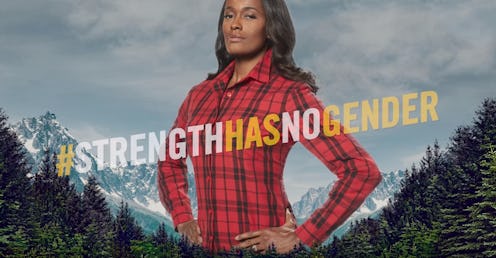Life
Brawny Man, Meet The Brawny Women

In honor of Women's History Month, everyone's favorite paper towel-based icon of masculinity, the Brawny Man, has been swapped out for Brawny Women as part of the aptly-named #StrengthHasNoGender campaign. Although the four powerful women of the campaign won't replace the mascot on physical packaging — so you're still free to linger in the paper towel aisle creeping on a cartoon character, if that's how you roll — their plaid-clad visages are set to appear regularly on the brand's social media accounts throughout the month of March, beginning on International Women's Day on March 8. Those featured embody different aspects of strength in their own ways, but they all have one thing in common: They're making their way as women in a male-dominated society.
Brawny writes on its website that the campaign is intended to celebrate all women, but it focuses on four notable women: Linda Alvarado, CEO and president of Alvarado Construction; Swin Cash, WNBA player; Dr. Valerie Montgomery Rice, dean and president of Morehouse School of Medicine; and Maureen Stoecklin, firefighter. Each is the focus of a brief documentary discussing the concept of strength and the obstacles they've faced as women, along with a photo shoot in the iconic Brawny Man flannel.
"Being a girl on a [construction] site, you're going to be laughed at — looked at as somebody who shouldn't be there and can't succeed," Alvarado explains. "The first person we have to convince is ourselves."
"When you walk into any profession, you have to look at it as ... you deserve to be there," Stoecklin says in her documentary. "You worked hard to be there. Gender has no play in it."
Brawny may seem like an odd choice to celebrate women's equality, not least because it's a paper towel company; as with any ad campaign, it should be noted that the first and foremost goal is marketing a product — and the campaign never explicitly discusses the polarizing word "feminism," even if it briefly features footage of second-wave protesters. That being said, #StrengthHasNoGender is a clear marker of how far mainstream acceptance of gender equality has come in recent years.
Since his creation in the 1970s, the mustachioed, barrel-chested Brawny Man has come to encapsulate a rugged sense of masculinity that hearkens back to days gone by, the kind of ultra-male Ron Swanson ideal cited by many who rail against the supposed decline of American masculinity. Ads generally depict the Brawny Man as a giant lumberjack-cum-hero swooping in to save women from appropriately large messes; while this style of advertising was par for the course in the 1970s, in the modern day, the effect is rather dated even after his recent makeover.
After all, gender roles are becoming increasingly flexible: Housework isn't seen as a women's chore (well, in theory), women are making increasing headway into male-dominated fields, and the concept of a gender binary itself is rightly being questioned. In the end, this rebranding of the The Brawny Man represents a larger step forward for women's equality, even if it does come as part of a marketing strategy. The iconic Brawny Man is undeniably recognizable, and the company's decision to use their platform to celebrate women is commendable, especially considering their use of gender-neutral language for the slogan. As Cash explains in her documentary, "Strength isn't defined by a man or a woman. Strength is defined by the person."
Check out the full campaign at Brawny's website.
Images: BrawnyTowels/YouTube (2)